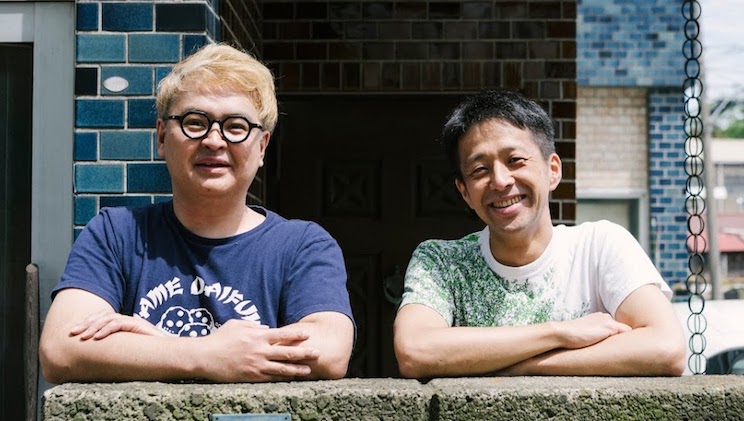I Want to See Undiscovered Vistas: Mr. Jiei Kato, Company Founder at Age 12, on a Quest for Things He Can Only Do in the “Present”
I Want to See Undiscovered Vistas: Mr. Jiei Kato, Company Founder at Age 12, on a Quest for Things He Can Only Do in the “Present”

Mr. Jiei Kato first drew attention in middle school at age 12, when he founded the online job exploration media “TANQ-JOB” for elementary and middle school students. He has also launched other companies, including “Challenge Fun,” media with a donation function to support challengers age 18 and under as a specialized crowdfunding source. The same Mr. Kato is also president of “Crystalroad,” a firm based in Nihonbashi since its founding. Free of conventional, fixed concepts that permeate our world, Mr. Kato continues to take on a variety of challenging in an effort to share “a way of life that does not give up on the present.” For this issue, we spoke with Mr. Kato after he made major news with “sensory masks” that debuted days early with his launch of Kabin Lab (meaning “hypersensitivity lab”) about his company’s vision and its journey so far, the significance of working as a middle school student, his relationship with the city, and more.
The reason to launch a company in middle school
-First, could you please tell us about your history, including launching a company at age 12?
Ever since I was a child, I’ve always wanted to have a job. Ever since I first started wanting to work at a cash register, I always pestered my parents and the adults around me about wanting a job. But they told me jobs were for adults, and I should go to school and study while I was young. The specific event that inspired me to launch a company was when my mother bought me a “Chemistry Quest” card game of the periodic table when I was in my first year of middle school. I learned it was created by a 12-year-old boy who founded a company, and wanted to become a company president myself.
-So what did you do then?
When I first tried talking with my mom about it, she said “sure, why not?” When I asked her about it afterwards, she said she hadn’t really believed I’d do it (laughter). When I went to my homeroom teacher to get permission, I was directed to create a business plan. I reflected on what I wanted to do as I did that, and ended up writing about supporting children in launching companies and crowdfunding exclusively for those age 18 and under. I’m sure it would’ve seemed childish to an adult who creates that sort of document routinely, but it gave me my first opportunity to envision what launching a company meant, in concrete terms. I had my homeroom teacher, the head teacher for my academic year, the vice principal and other people look over that business plan, and ultimately made an appointment with the principal to present on it. They permitted me to launch the company if I held to a few rules, and I registered the company with money I got through crowdfunding.

The subject of our interview, President of Crystalroad Mr. Jiei Kato, is just 14 years old
-Your mother is the representative director of Crystalroad, right?
A certified personal seal from the representative is required when establishing a corporation, but you can’t get one of those until you turn 15. So on that point, I decided to go with a parent-and-child enterprise with my mother as the representative director and me as the president and director. My mom didn’t have any experience founding a company, and of course I didn’t either, so we researched what we’d need for the next steps together, and got ready for them. My mom has always supported me, but I think she was a bit afraid when I went off the beaten path of graduating college before working, and headed off into the unknown.
-Did you feel any of that fear yourself, Mr. Kato?
About five percent of it. Everyone said various parts of a business launch were difficult, when I met and spoke with my seniors – people who have been in management a while. So I was shaken a bit and wasn’t sure I could handle it, and I was a bit uncertain about our business itself, too. But my desire to see a world I had never seen before was stronger, and I really wanted to take on the challenge, so my desire to launch a company never changed, in itself.
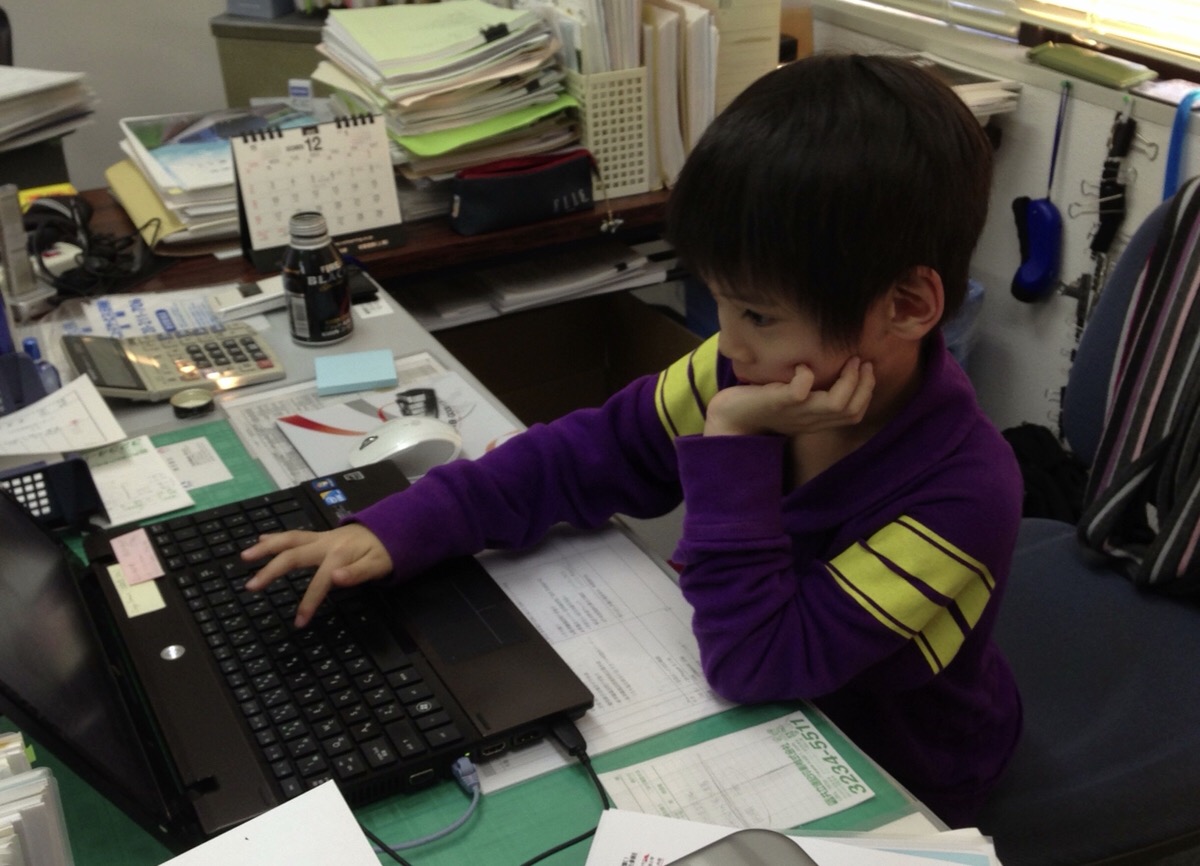
Mr. Kato at age five, using his mother’s computer
Sharing “a way of life that does not give up on the present”
-What was the first item of business at Crystalroad?
It involved operating “TANQ-JOB,” a job search information website for elementary and middle school students. I wanted to start a new type of media to convey the variety of work out there in the world, so that everyone in my generation could search for new jobs even though they could probably only imagine part-time work. I recruited the other operations team members via social media, myself excluded, and I got all sorts of participants from a third-grader at the low end to a high school senior at the high end. I realized a lot about myself by interviewing people from all sorts of jobs, and learned fundamental corporate communication, like how to write business emails. Still, I wasn’t able to smoothly monetize the media.
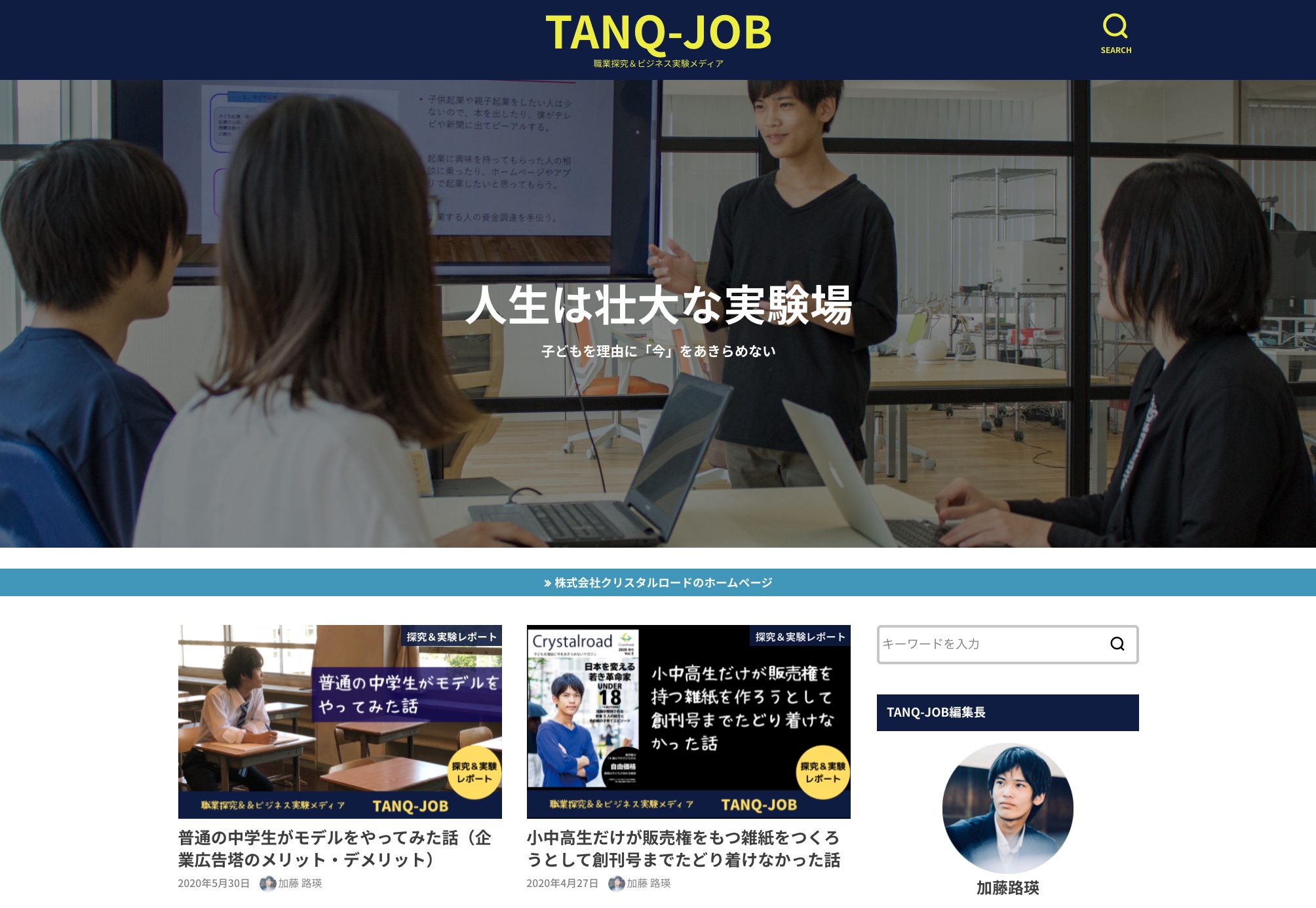
“TANQ-JOB,” the job-hunting web media for elementary and middle school students that was the first order of business at Crystalroad. Mr. Kato serves as chief editor for this media, which he continues to operate up to the present in a new form
-How do you feel, looking back on your first business project ever?
There’s a lot I’ve reflected on, like how I failed to pull the team together due to my weaknesses as chief editor. Also, when I reflect on it, I feel that we wasted an opportunity by failing to pursue the things only we could do as elementary and middle school media operators, and working to match adult quality instead. Since then, I’ve resolved to stop imitating things other people have already created. I’ve learned that even if I can replicate something smoothly, that doesn’t determine whether or not it will succeed.
-You’ve launched several businesses since then, Mr. Kato. Is there anything you’ve consistently prioritized through them all?
The thing I value most is “a way of life that does not give up on the present.” I think that the fixed concepts and general understandings of the world a lot of people have internalized are often obstacles for them when they try new things. I don’t want to give up on anything because of money or my age, or put off things I want to do, so I want to live by doing what I want, right away. That’s also my vision for society.
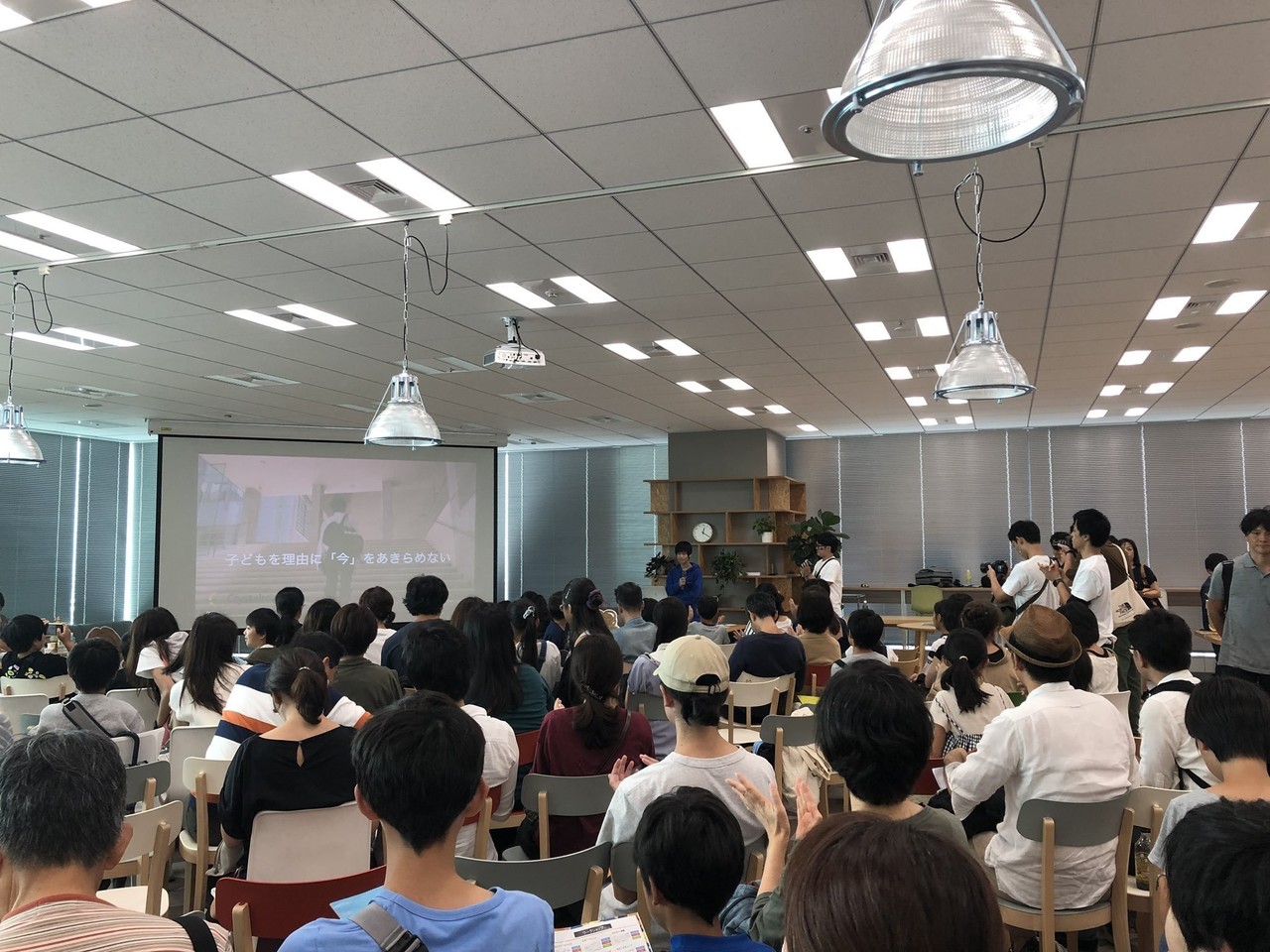
While managing his own businesses, Mr. Kato also often speaks at events, conferences, and seminars on entrepreneurial themes
Avoiding recognition of personal “concerns”
-Is Crystalroad’s latest project – “Kabin Lab” – also based on this philosophy of “not giving up on the present”?
Yes. When I was concerned about what to do after failing to produce great results from a variety of business launches, my dad told me that “if you’re going to launch a company, you should solve things than concern you, personally.” The concern that came to mind then was my hypersensitivity. It’s an issue that varies in its expression from person to person, but for example, I feel like LED lights are stabbing at me, and the sound of a window AC unit can make me feel sick. I was honestly afraid to confront my issues with hypersensitivity until then, so I avoided them, and searched for other fields of business. But I realized I was giving up on a lot of things while sharing the idea of “a way of life that does not give up on the present,” by saying the regional specialty dishes would make me sick if I traveled, or that I’d feel sick from the background music so there was no point in going to amusement parts. So I decided to start up “Kabin Lab.”
-What does Kabin Lab do?
First off, I wanted to create a community for people like me who are hypersensitive, and found about 20 participants after recruiting on social media. From there, I launched genuine research lab projects, created a character to represent hypersensitivity, created logos representing visual, auditory, and other hypersensitivity, and then put them on buttons and stickers. The novel coronavirus started to spread around them, and masks became critical for everyone, so I created communication cards people could put on nametags and so forth even if they struggled to wear masks due to hypersensitivity. I also thought up a “fan mask” that people could use instead of masks or face shields.
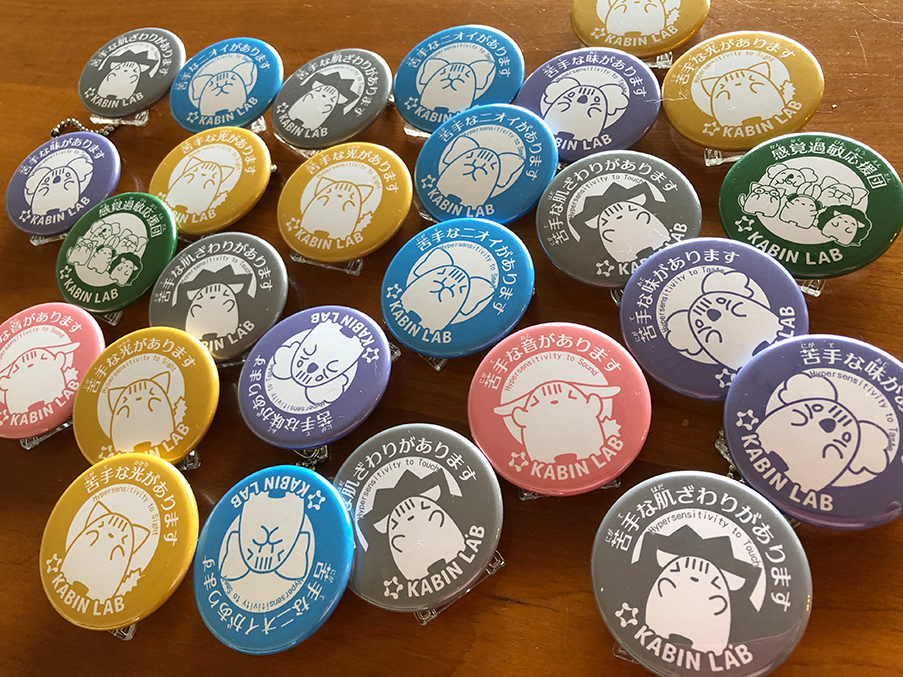
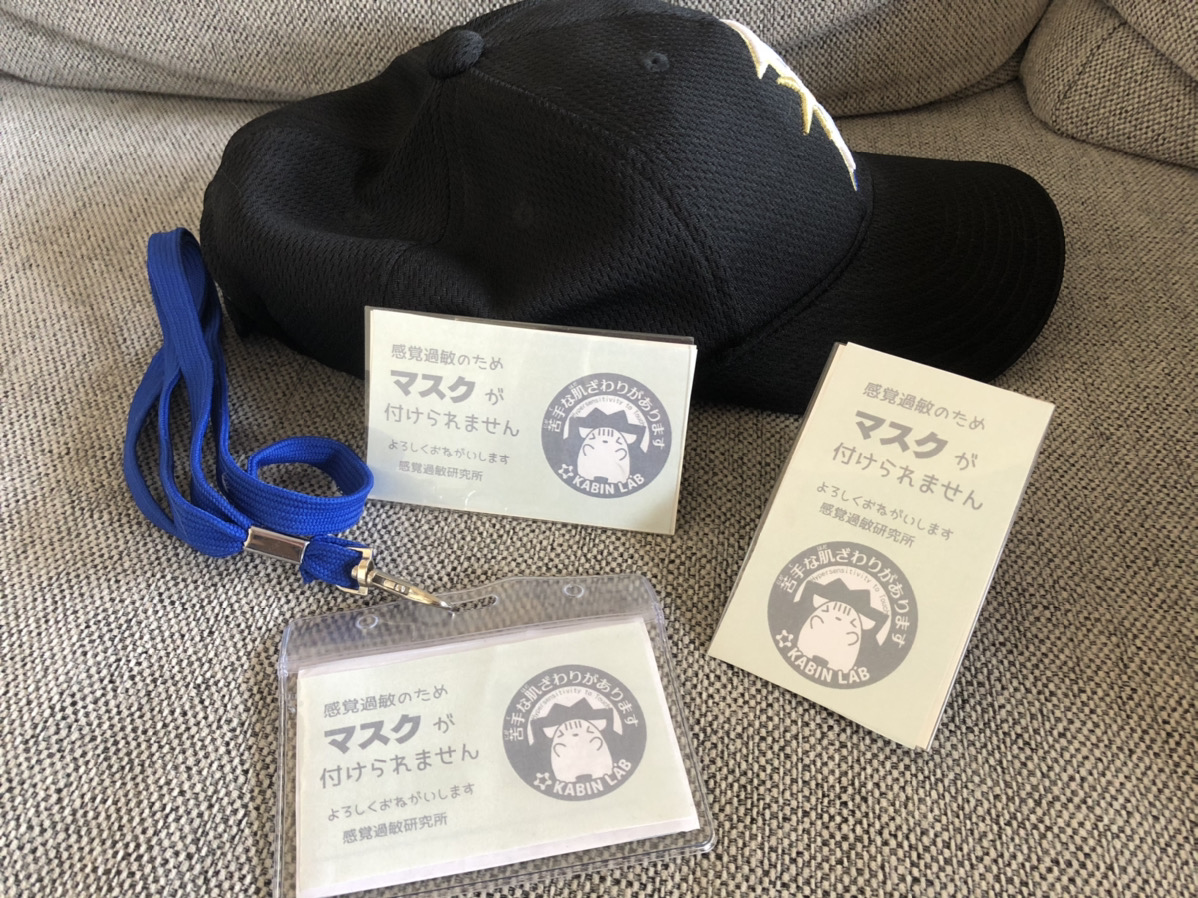
Buttons and communication cards created for people who struggle to wear masks due to hypersensitivity
-How did you come up with the “fan masks”?
I actually wanted to create masks that hypersensitive people could use even before the coronavirus pandemic, but I couldn’t come up with any good ideas for them. Even when I made the communication cards I mentioned earlier, there was some criticism that the cards alone didn’t help without a substitute for masks. Then someone on social media suggested something like a welder’s mask, and I came up with the idea for a fan-like mask. I brought that idea to the lab community, and people suggested a folding fan to make it easier to carry. So the “fan mask” came about, and uses water and alcohol-washable materials.

The Japanese name for the “fan mask” incorporates a homophone for “sense,” and the lineup of masks has now expanded to include transparent and black versions to address customer requests
-The “fan mask” drew a lot of attention, and was even noted in media a lot, wasn’t it?
Yes. I’m glad the media reported on it and informed a lot of people about hypersensitivity, and a wide range of people use them. Not just people with hypersensitivity, but also people at restaurants and bars, hospitals, and club hosts. After we released the first fan masks, people requested clear versions so people with visual impairments could lipread in conversation, and black versions since clear and white fan masks are reflective. So we expanded our lineup, and I’d like to continue to address requests like that in the future. Also, Kabin Lab aims to improve life for people who struggle with hypersensitivity, so now I want to create all sorts of items, not just masks.
The significance of having a job personally, right now
-It sounds like “Kabin Lab” is the sort of business “you can do because of who you are,” with how it confronts your personal concerns. Is that right?
Yes. Hypersensitivity is a struggle, but I think you could also view it as a talent that most people don’t have. For example, I’m hypersensitive to tastes, and notice small amounts of seasoning, so I might be suited to cooking as a role. Our final goal at Kabin Lab is free control of hypersensitivity, rather than its suppression. We think we’ll need to approach brain issues to achieve that, since the brain governs the senses, and we’re recently begun research into technologies and services that use neurotechnology. Over time, I want hypersensitivity to become a part of people’s individuality, and for society to accept people’s differences. Eventually, I hope the concept of hypersensitivity itself will fade out of society.
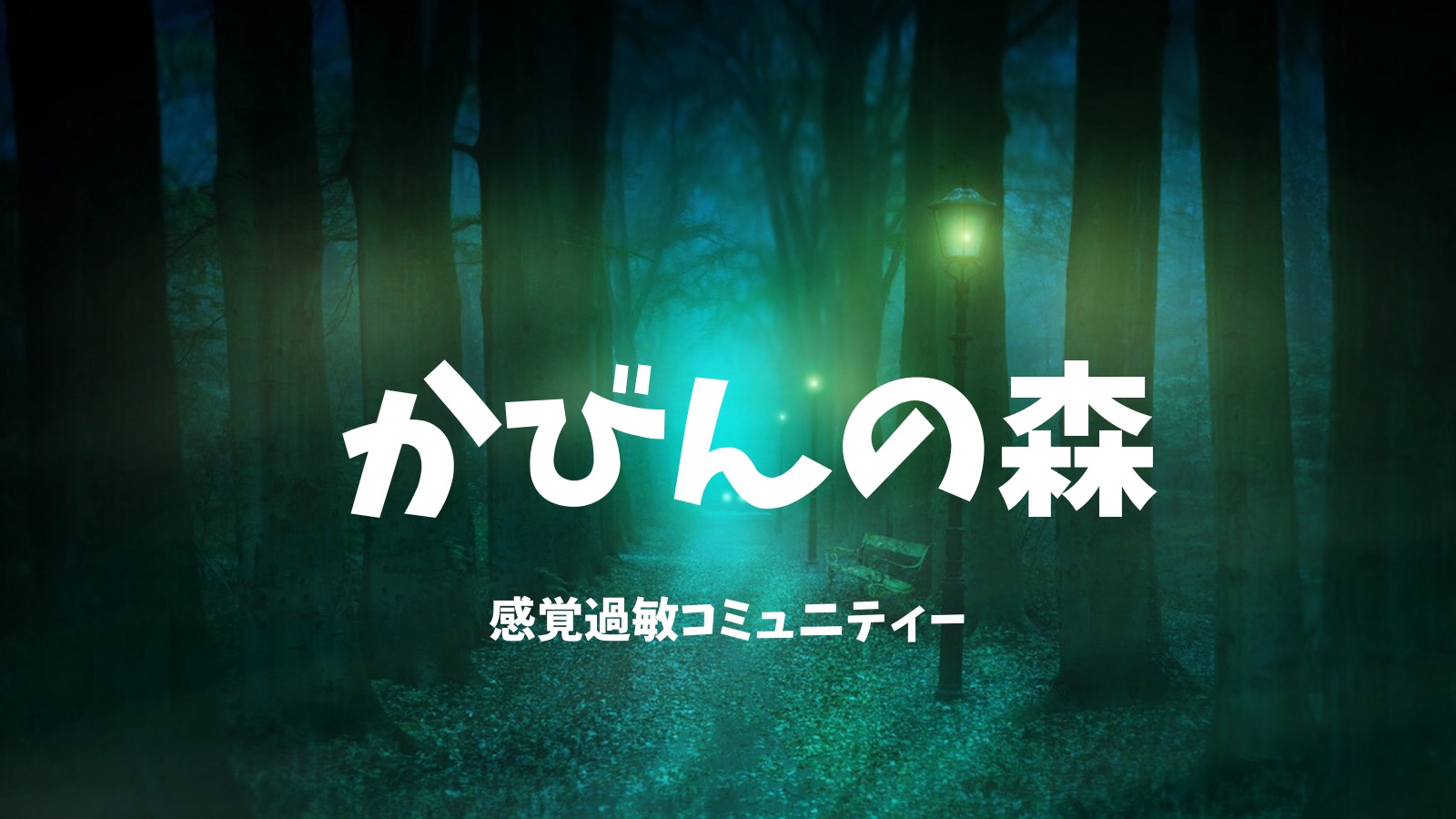
Kabin Lab operates “Kabin no Mori” (or “the forest of hypersensitivity”), a community that has grown to over 300 members in size. Members exchange information on hypersensitivity, share issues, and discuss ideas to solve those issues over the chat tool Discord
-People have usually focused on you as “the middle schooler company president,” Mr. Kato, but would you say that age isn’t relevant to the idea of “doing what you can do because of who you are”?
Yes, I would. I wanted to use whatever would be effective, and I don’t like being held back by my age. And I won’t be able to use my status as a middle schooler much longer (laughter). This is a bit of a fuzzy statement, so I don’t like it too much, but I want to follow through at the things I’m driven to do, in my own personal style. So in that sense, I’m currently looking for something else to use that I can follow through with, aside from my current project with Kabin Lab.
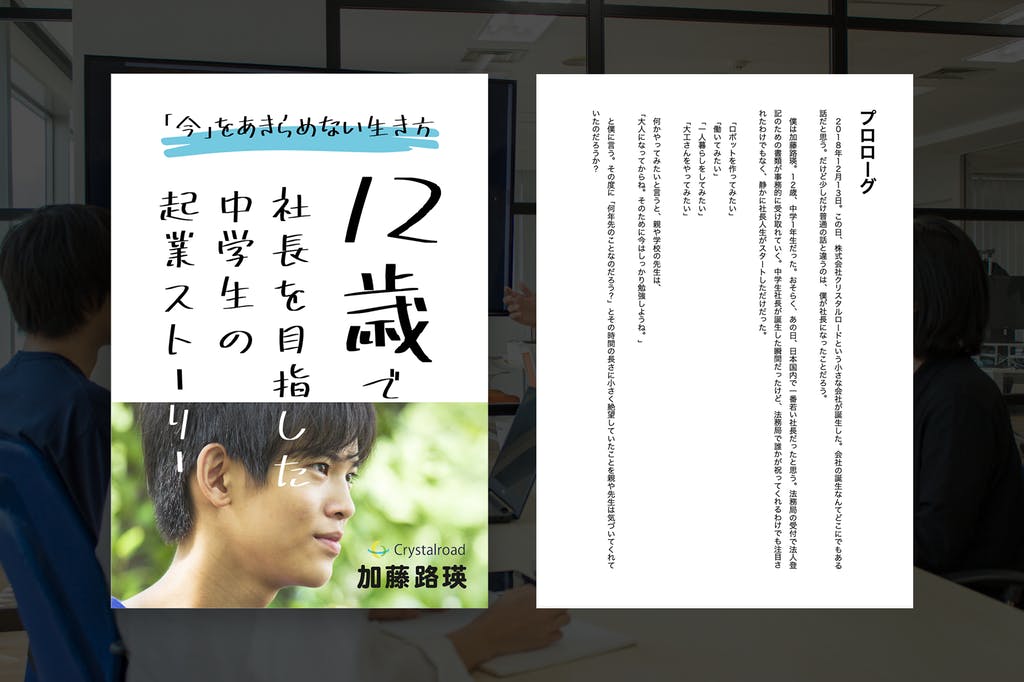
Mr. Kato’s book, published with money gathered via crowdfunding. He met his goal by collecting ¥2.5 million in 30 days, and published around 1,000 copies
-You achieved your childhood dream of working when you launched a company. How do you feel about the significance of work with all the experience you’ve gained since then, Mr. Kato?
My parents still pay for my expenses, so I don’t feel like I’m working to live. Working for me at present is about resolving my personal concerns, and it also feels like a way to get a view of things no one has seen before.
-On another front, how do you think about balancing work with school?
I think that you can balance them, generally. I can feel that I need to study English in addition to hypersensitivity and the brain, given my current projects, and I also just want to make more friends, so I want to go on to high school and college.

In addition to schoolwork, Mr. Kato also handles mentoring with more experienced managers, presentations for companies, interview requests, and more
What unfolds with a connection to Nihonbashi
-On another topic, could you tell us about how you came to select Nihonbashi for your headquarters, Mr. Kato?
I live in Chiba, but I used to go to a middle school in Tokyo, and Nihonbashi’s location was easy to reach from both my home and school. We’ve moved from the office I used to register the company when I founded it, now, and share space in “Nihonbashi Underground” nearby. The city of Tokyo assaults you with a variety of smells the moment you leave the station, which can make people like me sick, and the noise causes us headaches. But Nihonbashi is quiet and gentle on all five senses for someone hypersensitive like me, so I love it.
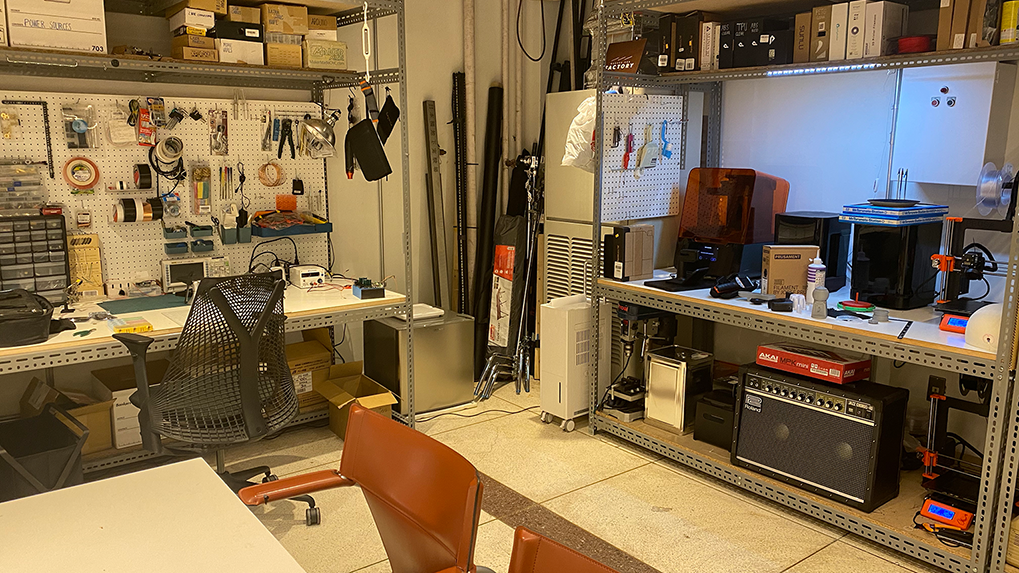
Mr. Kato’s current office is in Nihonbashi Underground, a hub for creators in a variety of roles fully equipped with 3D printers, laser cutters, and other fabrication equipment
-Do you commute to work every day?
With the novel coronavirus in play, lately I work from home in Chiba when I don’t have an in-person meeting. I currently attend “N Middle School,” but the other students’ laughter was torture for me at the other middle school I went to before that. I eventually switched to N Middle School, where there is no class structure, and we can study freely in quiet environments. I can only exist without strain in settings where noise and odors don’t bother me, with my hypersensitivity, so currently my home is the easiest setting for me to work from. But Nihonbashi Underground is away from main streets, too, and it’s quiet and pleasant. I also like how it has 3D printers and other equipment, and lots of fun demos made by other creators.
-It sounds like you might find inspiration from meeting and communicating with the diverse people who work in Nihonbashi, too. Is that right?
Yes, I think so. You catch glimpses of worlds you didn’t know about before when you talk with people, and I’ve always valued my connections with diverse people. I want to see more new worlds by meeting people and encountering companies of all sorts in Nihonbashi, since I’m connected to it this way, and then use that to broaden my own potential. For example, it would be great to expand our efforts even for the fan mask, by collaborating with established businesses and so forth in Nihonbashi.

-How would you feel about creating “a place you can exist without strain” in Nihonbashi, like you were talking about earlier?
That’s a good idea. I’ve always been searching for settings where I can exist without strain, and I also want to create one myself. The Kabin Lab community is currently around 300 people, and we’re making progress on discussion of “quiet hour/quiet area” projects where businesses and facilities create times or spaces for real quiet, without sensory stimuli. I’ve always gotten the impression that Nihonbashi is a quiet area, so it would be fun if I was able to create a space where people with hypersensitivity could exist without strain, in cooperation with the local residents.
Interview and text: Yuki Harada (Qonversations), photography: Daisuke Okamura
Jiei Kato
Born in Chiba in 2006. Learned people could become company presidents at age 12 upon playing the “Chemistry Quest” card game (developed by a 12-year-old boy) during June of his first year of middle school, and resolved to start a company. As a child, his goal is a society that does not give up on the present, and he operates media and gives talks to encourage children to take on challenges. He recently launched “Kabin Lab” on the theme of hypersensitivity – and issue he also struggles with – with aims of making society more friendly to people with hypersensitivity. He currently focuses his efforts on raising awareness of hypersensitivity, product development, and research.


